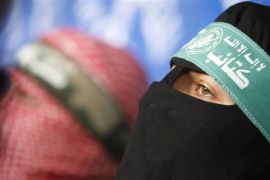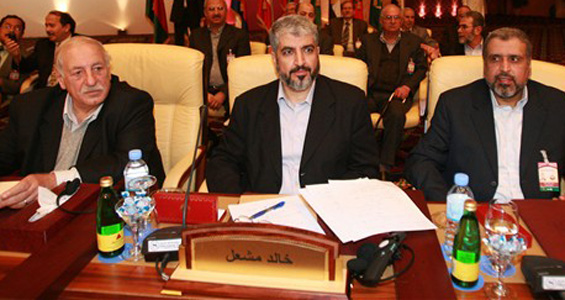Palestinian factions united by war
But will the veneer of a unified front against Israel hold up to the ceasefires?

 |
| Khaled Meshaal, the leader of Hamas, centre, Ramadan Abdullah Shallah, the leader of Islamic Jihad, right, and Ahmed Jibril of the PFLP, left, attend a summit in Doha [AFP] |
The al-Aqsa Martyr’s Brigade, an armed wing of Fatah, once threatened to kill Khalid Meshaal, the leader of Hamas.
However, from the beginning of the war on Gaza up to the ceasefire called by Palestinian factions on Sunday, it was fighting shoulder to shoulder with its former rival, lobbing rockets into Israel from the beleaguered coastal strip, Fatah representatives in Damascus say.
Israel says it has dealt Hamas a crippling blow, but its 22-day onslaught that killed around 1,300 civilians and injured at least 6,000 more has brought together a slew of Palestinian factions, many of them previously sworn enemies of Hamas.
Many observers are left wondering if the Hamas-allied coalition will be a new front against Israel and whether Hamas will be able to prevent other factions from launching attacks from Gaza, breaking the fragile calm.
“Israel’s aggression on Gaza has unified the Palestinian groups in the face of the Zionist aggression,” says Mohammed Nazzal, a member of Hamas’ political bureau in Damascus.
Coordinated attacks
Several factions have been staking claims in the fight in Gaza.
Daily updates on the websites of the armed wings of Fatah, Islamic Jihad, the Popular Front for the Liberation of Palestine (PFLP), the Popular Resistance Councils, and other groups – variously decorated with rocket-propelled grenade toting men, Quranic verse, jagged communist style art, and pictures of the late Yasser Arafat – have claimed responsibility for attacks on Israeli troops and rockets launched into Israel.
Most groups claim to be launching coordinated attacks with Hamas and other factions.
On its website, Islamic Jihad says it has lobbed 262 rockets into Israel since the war began, many of which it says were fired in concert with Hamas.
Israeli military sources say that at least 750 rockets have been shot into Israel since Operation Cast Lead began, killing three civilians. They say ten soldiers have been killed and over 100 injured.
Abbas undermined
According to Sameer Rifai, the Fatah representative in Damascus, the fact that some of those rockets were fired by Fatah members contradicts the official stance of Mahmoud Abbas, the party’s leader and the Palestinian president.
Abbas had been calling for both sides to unconditionally cease hostilities in Gaza; a stance that many say will cost Fatah much of its former support.
| IN DEPTH |
 Latest news and analysis from Gaza and Israel |
 Track the war and submit your own reports |
 Send us your views and eyewitness videos |
 Watch our coverage of the war on Gaza |
The al-Aqsa Martyrs Brigade has been acting without the consent of the Fatah leadership, Rifai said.
He added, however, that the group was engaged in a “legitimate form of defence”.
“The al-Aqsa Martyrs Brigades are a part of the Palestinian people in Gaza,” he said in an interview last week.
“They are defending their homes, their lives, and themselves. They are people fighting an occupation.”
Some analysts say the fact that factions of Fatah have been fighting in Gaza symbolises the high level of disintegration within the organisation.
“[Abbas’] grassroots support doesn’t want to be linked to or feel that it is a part of an organisation that has not participated in defending fellow Palestinians,” says Maha Azzam, an associate fellow at the Middle East Centre at Chatham House.
They are saying “our leadership may be wrong, but there are those among us at the grassroots level that are willing to stand by our brethren in Gaza,” says Azzam, adding that “this delegitimises Abbas’ role enormously”.
Hamas support growing
Meanwhile, in Damascus, the de facto capital of many Palestinian factions, the role of Hamas seems to be gaining greater legitimacy.
On Sunday, Musa Abu Marzuq, the deputy of Hamas’ political bureau, appeared on Syrian television, speaking not in the name of Hamas, but “in the name of Palestinian resistance factions” to declare a one-week ceasefire and to insist that all Israeli troops leave within that time period and that border crossings be opened.
But despite the veneer of a unified front against Israel, Hamas might not be able to hold together an alliance of such disparate groups for long, analysts say.
One faction, the secular PFLP, has already dissented. Maher Taher, the PFLP’s representative in Damascus, declined to comment on their decision, but in an interview with Al Jazeera, he insisted that “the Israeli attack is continuing”.
“The PFLP is fighting on the ground against this barbaric invasion by Israel,” he said in an interview last week, before the ceasefire.
“This is a battle involving all of the Palestinian people.”
Last week, several other Palestinian factions in Damascus issued a statement refusing “any security arrangements that affect the resistance and its legitimate right to struggle against the occupation”.
The coalition was composed of representatives of Hamas, Islamic Jihad, the PFLP, Al Saiqa, the Popular Struggle Front, the Revolutionary Communist Party, Palestinian Liberation organisation, Fatah’s ‘Intifada’ faction, and a number of other Palestinian groups.
They categorically refused the presence of international forces in Gaza, a proposition put forth in part by Abbas. They also said that any peace initiatives must include the immediate secession of Israeli attacks, the full withdrawal of Israeli forces from Gaza, an end to the economic blockade, and an opening of all of Gaza’s crossings, including the Rafah crossing with Egypt.
Temporary alliance
“This [alliance] will last so long as there is a crisis,” Azzam says.
“Once stability is reached and the political process gets under way, which isn’t particularly viable in the foreseeable future, then we will see the factionalism come to the fore again.”
But whether or not Hamas’ allies stay allies may not make much of a difference for Israel, observers say, adding that the different factions will either continue to stand behind Hamas, bolstering the group’s legitimacy in Gaza, or break away and start launching rockets in violation of the ceasefires.
“All factions will need to agree on one position” for the conflict to come to a final solution, Taher said last week.
It is unclear what exactly that position will be, but with most factions still reserving the right to launch rockets outside of the one week ceasefire, an ultimate solution may still be a long way off.
Taher said: “We are not going to give up our right to resist until Israel ends the occupation.”